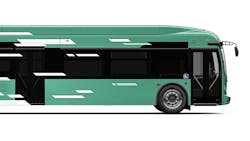NFI receives order for 165 hybrid-electric buses from Mississauga Ontario’s MiWay
Mississauga Transit (MiWay) has awarded NFI subsidiary New Flyer Industries Canada ULC (New Flyer) a two-year contract for 127 Xcelsior® 40-foot hybrid-electric buses and 38 Xcelsior 60-foot hybrid-electric buses (76 equivalent units or EUs), for a total of 203 EUs.
New Flyer equips all 165 hybrid-electric buses with BAE Systems next-generation Modular Accessory Power System (MAPS), offering a multi-functional and light-weight modular design that delivers best-in-class performance. In addition to MAPS, buses are configured with geofencing technology, which uses GPS navigation to define the transit route sections where hybrid-electric buses operate in an electric vehicle mode.
The low-emission hybrid-electric Xcelsior® buses with MAPS technology onboard will deliver increased fleet efficiency, reliability and sustainability. Through this order, MiWay is helping to fulfill its 40-year Strategic Plan, focused on developing a transit-oriented city through expanding its transit system and practicing environmentally responsible approaches to reduce emissions and improve air quality.
“NFI has been leading hybrid-electric innovation for over 20 years, supplying more hybrid-electric buses across North America – in more configurations – than any other manufacturer,” said Chris Stoddart, president, North American Bus and Coach. “Our partnership with MiWay spans 45 years, having delivered 550 buses since 1976. Today, we continue to support MiWay in its transition to cleaner transportation by leveraging hybrid-electric mobility that will immediately reduce greenhouse gas emissions in the greater Mississauga community.”
New Flyer says its hybrid-electric buses bridge the transition between traditional combustion engines and zero-emission propulsion, reducing NOx emissions by up to 50 percent and particulate matter levels by up to 100 percent while also lowering fuel use and maintenance costs.
